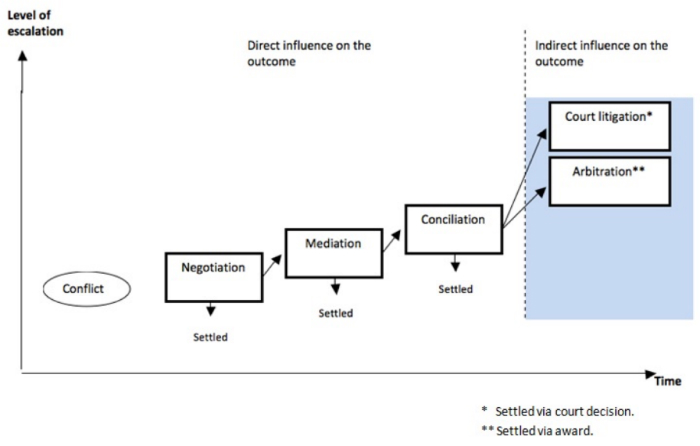Alternative Dispute Resolution (ADR) is an alternative legal course to general litigation. Both small businesses and major companies alike tend to prefer ADR to the standard court case as the first course of action to a dispute. ADR essentially involves a ‘settlement’ that is deemed fair by both the competing parties, and this settlement allows the two parties to understand each other’s point of view. Definitely, once that happens, there’s a greater chance of a win-win situation. The most popular types of Alternative Dispute Resolution include Arbitration, Negotiation, and Mediation.
You Don’t Win, But You don’t Lose Either
When most law firms sense that the dispute is complex and the case may hang in balance, they will recommend an Alternative Dispute Resolution. With standard court hearings, there’s a certainty that the outcome represents a victory at the expense of the other party’s defeat. However, with Alternative Dispute Resolution, through the process of a negotiation or arbitration, there’s a high likelihood that the two parties emerge from the discussion with an acceptable outcome for both. It is this lack of risk that makes Alternative Dispute Resolution a desirable option for small businesses in particular, that can’t withstand the damage of a loss.
You Get Confidentiality
An Alternative Dispute Resolution essentially involves a settlement that takes place in private, and this ensures complete secrecy. Large corporations often face intense media scrutiny that has the capacity to alter their public image. Court hearings are public events and the details of the issue central to the case don’t remain private. There is a reason law firms recommend out-of-court Alternative Dispute Resolution methods when the case is particularly sensitive.
You Get Cost Effectiveness
The primary reason why small businesses prefer Alternative Dispute Resolution is that an in-house legal team is expensive and the unpredictability of the court proceedings make legal fees an even greater challenge. On the other hand, the legal charges that you face are drastically reduced when we’re considering an ADR. Furthermore, the legal expenses that the two parties bear during the Alternative Dispute Resolution process are partly shared, thus adding to its desirability.
You Get Flexibility
The disputing parties have the luxury of selecting the medium through they which they intend to resolve the dispute. The parties also have the flexibility of deciding when they resolve the dispute, where they resolve the dispute, and the third-party mediator or arbitrator who will oversee the resolution. As opposed to general litigation, where the verdict the court announces has an element of finality to it, with ADR the parties also retain the authority to disagree with or reject the solution that’s presented by the third party.
An Alternative Dispute Resolution has several benefits of its own, but there are certain situations when you can’t avoid litigation. To know if that’s the case, we recommended a consultation with a reputed law firm to gain clarity.

